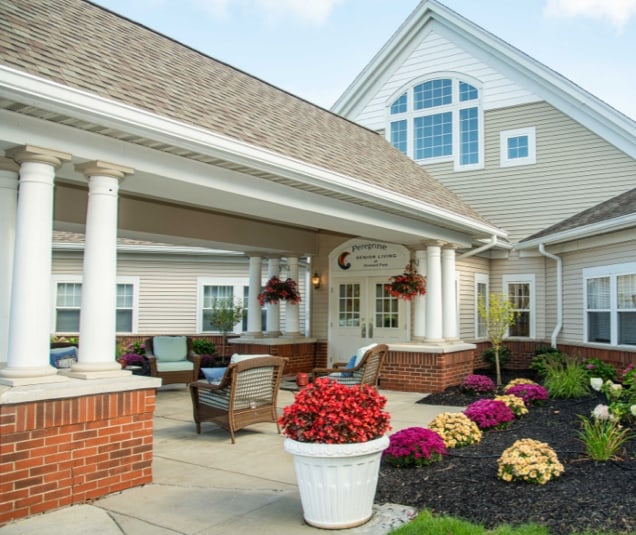If your loved one is living with dementia or Alzheimer’s disease, there may come a time when they may require full-time professional care. Families may be able to provide care to their loved ones experiencing cognitive impairment, but this presents itself with its own set of challenges. A professional memory care community can provide services and amenities that homecare may otherwise lack.
Memory care is a community with full-time care designed for individuals living with cognitive impairment. Memory care is best for residents who are unable to safely live independently and require supervised care.
Our program at Peregrine Senior Living provides an innovative approach to memory care. The Peregrine Way® uses ways for residents to stimulate their mind, body, and spirit with activities to help cognitive function.
How Memory Care Helps Residents
Memory care is designed for individuals living with Alzheimer’s disease or dementia who are experiencing cognitive decline and need assistance with activities of daily living. Memory care is a specialized type of long-term care that provides residents with a high level of support, assistance, and structure, with a focus on activities that help to stimulate and improve cognitive function.
The Peregrine Way®
Our innovative approach to memory care, The Peregrine Way®, focuses on engaging residents’ long-term memories to help create a brighter present. Through tailored activity programs and memory care-trained staff, we create an environment that promotes engagement and quality of life for our residents.
Signs Your Loved One Is Ready for Memory Care
When seeking memory care, it’s important to recognize that each person with dementia or Alzheimer’s disease is unique. No single formula outlines when it’s the right time to transition into memory care.
There are some signs to look for that may suggest your loved one will benefit from living in a memory care community. It’s important to keep your loved ones’ overall safety, health, and well-being in mind.
Your Loved One is Unable to Safely Care for Themselves
One major sign that indicates your loved one will benefit from memory care is that they are no longer able to safely perform activities of daily living independently. This can range from forgetting to take their prescription medication or taking too much of their medication. Their hygiene may be neglected as they are unable to bathe or groom without supervised assistance.
This sign can also manifest itself as a danger to your loved ones’ overall safety. Individuals with dementia or Alzheimer’s disease can unknowingly become a danger to themselves and others. There may come a time when your loved one has unexplained bruises or signs of injury.
Your loved one may accidentally forget to turn off appliances like ovens, stoves, or irons, creating a risk of fire. Additional safety hazards include wandering. Individuals with dementia may wander or get lost in an unfamiliar environment. Wandering puts your loved one at risk for an unsafe situation.
Memory care is designed to address these safety concerns for your loved one. Supervised care staff and layout design help to keep your loved one safe from falls and injury and reduce the risk of wandering.
They’re Becoming Less Social
Changes in behavior may be subtle and range from changes in mood to social interaction. Your loved one may become more irritated and experience mood swings. With dementia, your loved one may gradually start to isolate from group or social activities. There may come a time when your loved one is unable to successfully communicate with others and will have difficulty engaging in conversation. Dementia can impair an individual’s ability to communicate with others.
This inability to successfully communicate and follow social activities may cause your loved one to be socially isolated from others. To maintain healthy well-being, social interaction is important to keep emotionally stimulated and can help to slow down the progression of dementia.
Memory care helps to address these concerns. Curated activities are designed to help promote cognitive function and encourage social interaction with other residents.
You’re Experiencing Caregiver Burnout
We understand that being a primary caregiver to your loved one experiencing impaired cognitive function is both challenging and rewarding. Caregiver burnout is common. It’s a serious concern as the stress you may experience as a caregiver can negatively impact the care you’re able to provide to your loved one. Burnout may also affect your overall health and well-being.
There may come a time when your loved one will need additional support and assistance that cannot be provided by one primary caregiver alone. Memory care can provide around-the-clock professional care and assistance for your loved one.

Let Us Help with the Transition to Memory Care
Caring for an individual experiencing cognitive decline presents itself with challenges. Memory care provides your loved one with a quality life through social interaction and activity, all while ensuring their overall safety and well-being. Our team at Peregrine Senior Living is here to help guide you through this process. Contact us today to learn more about how we can support your family.












Happy Valentine’s Day! ❤️
Love takes many forms—between partners, friends, families, and even across generations.
Today we celebrate the love that fills our community: the care shared between residents and team members, the laughter that brightens our halls, and the sense of belonging that reminds us we’re never alone.
May your day be filled with connection, warmth, and heart.
peregrineorchardpark.com/ ... See MoreSee Less
0 CommentsComment on Facebook
Today we were able to celebrate Valentine’s Day a few days early with our annual Valentine’s Day couples luncheon  ... See MoreSee Less
5 CommentsComment on Facebook
February is American Heart Month, a time to focus on caring for the muscle that keeps us moving and thriving. 🫀
We encourage residents to take heart-healthy steps every day: enjoying balanced meals, staying active, connecting socially, and taking moments to rest and recharge.
Together, we can make heart health a daily celebration of life and well-being.
peregrineorchardpark.com/ ... See MoreSee Less
0 CommentsComment on Facebook
It’s a good news minstrel’s kinda of day ... See MoreSee Less
1 CommentsComment on Facebook
Want to stay connected with what’s happening across our community?
Follow us on Instagram for updates, moments we love, and stories worth sharing.
Come join the community by following us via the link below ⬇️
www.instagram.com/peregrineorchardpark/ ... See MoreSee Less
0 CommentsComment on Facebook
On Super Bowl Sunday, it appears that many fans are supporting any team except the Patriots. ... See MoreSee Less
1 CommentsComment on Facebook
This month, we celebrate the incredible achievements, resilience, and cultural richness of Black Americans who have shaped our history and continue to inspire our future.
We believe in honoring every story and embracing the diverse experiences that strengthen our community. May this month remind us all to listen, learn, and uplift—today and always.
peregrineorchardpark.com/ ... See MoreSee Less
0 CommentsComment on Facebook